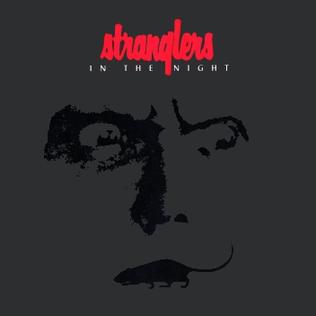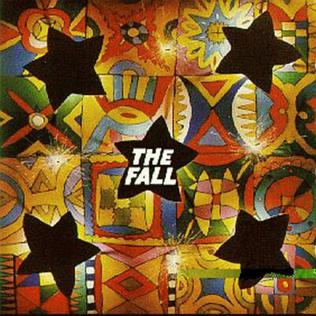
The Fall were an English post-punk group, formed in 1976 in Prestwich, Greater Manchester. They underwent many line-up changes, with vocalist and founder Mark E. Smith as the only constant member. The Fall's long-term musicians included drummers Paul Hanley, Simon Wolstencroft and Karl Burns; guitarists Marc Riley, Craig Scanlon and Brix Smith; and bassist Steve Hanley, whose melodic, circular bass lines are widely credited with shaping the band's sound from early 1980s albums such as Hex Enduction Hour to the late 1990s.

Slates is an EP by the Fall, released on 27 April 1981 by Rough Trade Records. It was one of singer Mark E. Smith's favourite Fall releases, and he claimed it was aimed at "people who didn't buy records".

Live at Donington is a live album and video by the English heavy metal band Iron Maiden, documenting their second headlining appearance at the Monsters of Rock festival at Donington Park, a motorsport circuit located near Castle Donington. The concert took place on 22 August 1992 during the Fear of the Dark Tour in front of a crowd of almost 80,000.

Dragnet is the second studio album by English post-punk band the Fall, released on 26 October 1979 through Step-Forward Records. Appearing less than eight months after its predecessor, Live at the Witch Trials,Dragnet established at an early stage two key patterns characteristic of the group's future: that of high productivity and that of a regular turnover of group members.

Läther is the sixty-fifth official album by Frank Zappa. It was released posthumously as a three-CD set on Rykodisc in 1996. The album's title is derived from bits of comic dialog that link the songs. Zappa also explained that the name is a joke, based on "common bastardized pronunciation of Germanic syllables by the Swiss."

Perverted by Language is the sixth studio album by English post-punk group The Fall, released in December 1983 on Rough Trade Records.

The Wonderful and Frightening World Of... is the seventh studio album by English musical group the Fall, released in October 1984. It was the band's first album after signing to the Beggars Banquet label. Newcomer Brix Smith co-wrote three of the tracks, ushering in a relatively pop-oriented sound for the group. Paul Hanley left the band immediately after the accompanying UK tour, ending the group's distinctive "twin drummers" period.

The Infotainment Scan is the fifteenth album by The Fall, released in 1993 on Permanent Records in the UK and by Matador Records in the USA. At the time of its release, it was considered the band's most accessible album and came when the band were experiencing unprecedented recognition in the media. It entered the UK Albums Chart at number 9, making it their highest-charting album.

Stranglers in the Night is the eleventh studio album by the Stranglers and the first release on the band's own record label, Psycho, in 1992.

Shift-Work is the 13th album by English rock band the Fall, released through Phonogram Records in 1991. The Fall started working on the album in 1990 while touring in support of Extricate. Mark E. Smith sacked guitarist Martin Bramah and keyboardist Marcia Schofield immediately after the Australian leg of the tour, reducing the lineup to four for the first time in band's history. Only one song ("Rose") from the sessions with Bramah and Schofield eventually appeared on the album. Several tracks were released as the Dredger EP in August 1990, including "Life Just Bounces", which would later be re-recorded for Cerebral Caustic. The Fall's first release with a reduced lineup was the single "High Tension Line" in December 1990.

Cerebral Caustic is the seventeenth full-length studio album by English post-punk group The Fall, released in 1995 on Permanent Records. It spent one week on the UK Albums Chart at number 67, 19 places lower than its predecessor Middle Class Revolt, marking the end of one of the group's relatively more successful periods.

The Light User Syndrome is the 18th album by the Fall, released in 1996 on Jet Records. It was the group's first album to feature keyboard player and guitarist Julia Nagle and the last to feature Brix Smith, while longtime guitarist Craig Scanlon was fired in late 1995 during troubled recording sessions for "The Chiselers" single which preceded the album. A version of "The Chiselers" is included on the album as "Interlude/Chilinism".

Levitate is the 19th album by The Fall, released in 1997 on Artful Records. Levitate became the last album to feature two long-time Fall members, drummer Karl Burns and bass player Steve Hanley.

Imperial Wax Solvent is a studio album by the Fall – the band's 26th – released in the UK on 28 April 2008.

Singles Collection is a compilation album by The Coral, released on 15 September 2008 in the United Kingdom on the Deltasonic label. It featured a new song "Being Somebody Else", which was released as a single on 8 September 2008.
The Transmitters were a British art rock/post-punk band active during the late 1970s and throughout the 1980s. Mixing elements of punk, jazz and psychedelia, the band were critical favourites throughout their lifetime and played support slots for a wide variety of underground and mainstream bands, although this did not translate into substantial commercial success.

The Mission are an English gothic rock band formed in 1986. Initially known as The Sisterhood, the band was started by frontman Wayne Hussey and bassist Craig Adams, soon adding drummer Mick Brown and guitarist Simon Hinkler. Aside from Hussey, the lineup has changed several times during the years and the band has been on hiatus twice.

"Free Range" is a song by British post-punk band the Fall, written by vocalist Mark E. Smith with the band's drummer Simon Wolstencroft. It was released on the band's 1992 album Code: Selfish, and as a single, reaching number 40 on the UK singles chart and becoming the highest-charting single of any of the Fall's original songs. The single and album versions differ as the album version includes part of a different take.

"Why Are People Grudgeful?" is a 1993 single by British post-punk band the Fall. It reached number 43 on the UK singles chart. The song is based on two Jamaican recordings from 1968, "People Funny Boy" by Lee Perry, and its answer record, "People Grudgeful" by Joe Gibbs, which are regarded as being among the first reggae records.

Hip Priest and Kamerads is a 1985 compilation album by British rock band The Fall, containing tracks taken from their releases on the Kamera label together with a previously-unreleased live track from the same era. It was subsequently reissued with a further four live tracks added.



















